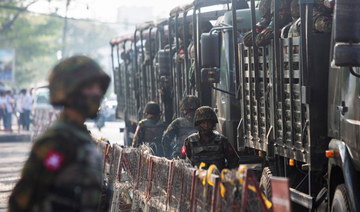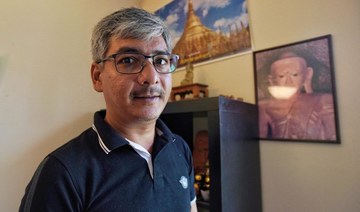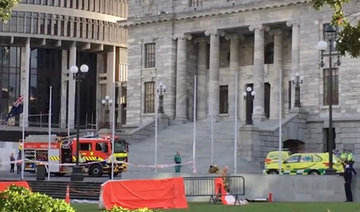YANGON: An American journalist detained for months by Myanmar’s junta has been denied bail and hit with a third criminal charge, his lawyer said on Thursday.
Danny Fenster, managing editor of Frontier Myanmar, was held in May as he attempted to leave the country.
He is currently on trial for allegedly encouraging dissent against the military and unlawful association, and faces six years in jail if convicted on both counts.
At his latest hearing inside Yangon’s Insein prison on Wednesday, “he was told another charge was added” for allegedly breaching immigration law, his lawyer Than Zaw Aung said.
The charge carries a maximum of five years in jail and the trial was expected to begin on Friday, he said.
“We do not know the exact reason for adding (the) immigration charge,” he said, adding Fenster’s visa was still valid when he was detained.
The new charge comes a day after former US diplomat and hostage negotiator Bill Richardson met junta chief Min Aung Hlaing in the capital Naypyidaw, handing the increasingly isolated junta some rare publicity.
Richardson is in the country on a “private humanitarian mission,” his organization said in a statement announcing the trip that did not mention whether he would seek Fenster’s release.
The former governor of New Mexico has negotiated “the release of hostages and American servicemen in North Korea, Cuba, Iraq and the Sudan,” according to his center’s website.
Fenster, 37, “is in good health physically but he’s upset because of increased charges,” Than Zaw Aung said.
He is believed to have contracted Covid-19 during his detention, family members said during a conference call with American journalists in August.
Myanmar has been in turmoil since the military seized power in a February 1 coup and ousted Aung San Suu Kyi’s elected government.
More than 1,200 people have been killed by security forces in a crackdown on dissent, according to a local monitoring group.
The press has also been squeezed as the junta tries to tighten control over the flow of information, throttling Internet access and revoking the licenses of local media outlets.
US journalist detained in Myanmar hit with third charge – lawyer
https://arab.news/b6rar
US journalist detained in Myanmar hit with third charge – lawyer

- Danny Fenster, managing editor of Frontier Myanmar, was held in May as he attempted to leave the country
Man who set himself on fire outside Trump trial dies of injuries, police say
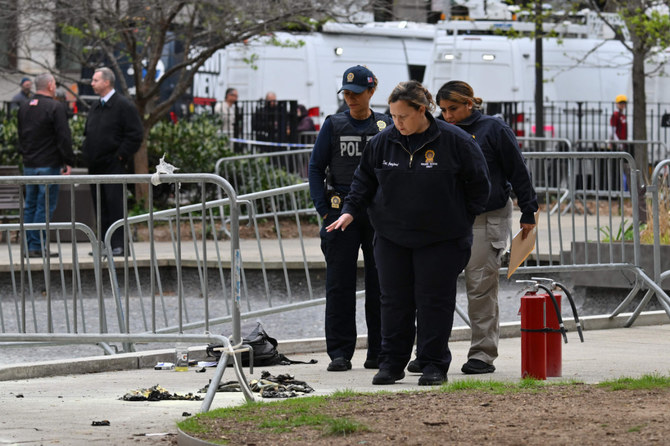
- Some officers and bystanders rushed to the aid of the man
- The man, who police said recently traveled from Florida to New York, had not breached any security checkpoints to access the park
NEW YORK: A man who doused himself in an accelerant and set himself on fire outside the courthouse where former President Donald Trump is on trial has died, police said.
The New York City Police Department told The Associated Press early Saturday that the man was declared dead by staff at an area hospital.
The man was in Collect Pond Park around 1:30 p.m. Friday when he took out pamphlets espousing conspiracy theories, tossed them around, then doused himself in an accelerant and set himself on fire, officials and witnesses said.
A large number of police officers were nearby when it happened. Some officers and bystanders rushed to the aid of the man, who was hospitalized in critical condition at the time.
The man, who police said recently traveled from Florida to New York, had not breached any security checkpoints to access the park.
The park outside the courthouse has been a gathering spot for protesters, journalists and gawkers throughout Trump’s trial, which began with jury selection Monday.
Through Friday, the streets and sidewalks in the area around the courthouse were generally wide open and crowds have been small and largely orderly.
Authorities said they were also reviewing the security protocols, including whether to restrict access to the park. The side street where Trump enters and leaves the building is off limits.
“We may have to shut this area down,” New York City Police Department Deputy Commissioner Kaz Daughtry said at a news conference outside the courthouse Friday, adding that officials would discuss the security plan soon.
Russian war correspondent for Izvestia killed in Ukraine

- Izvestia said Semyon Eremin, 42, died of wounds from a drone attack in Zaporizhzhia region
- Eremin had reported for the Russian daily from hottest battles in Ukraine during the 25-month-old war
Semyon Eremin, a war correspondent for the Russian daily Izvestia, was killed on Friday in a drone attack in southeastern Ukraine, the daily said.
Izvestia said Eremin, 42, died of wounds suffered when a drone made a second pass over the area where he was reporting in Zaporizhzhia region.
Izvestia said Eremin had sent reports from many of the hottest battles in Ukraine’s eastern regions during the 25-month-old war, including Mariupol, besieged by Russian troops for nearly three months in 2022.
He had also reported from Maryinka and Vuhledar, towns at the center of many months of heavy fighting.
WhatsApp being used to target Palestinians through Israel’s Lavender AI system

- Targets’ selection based on membership to some WhatsApp groups, new report reveals
- Accusation raises questions about app’s privacy and encryption claims
LONDON: WhatsApp is allegedly being used to target Palestinians through Israel’s contentious artificial intelligence system, Lavender, which has been linked to the deaths of Palestinian civilians in Gaza, recent reports have revealed.
Earlier this month, Israeli-Palestinian publication +972 Magazine and Hebrew-language outlet Local Call published a report by journalist Yuval Abraham, exposing the Israeli army’s use of an AI system capable of identifying targets associated with Hamas or Palestinian Islamic Jihad.
This revelation, corroborated by six Israeli intelligence officers involved in the project, has sparked international outrage, as it suggested Lavender has been used by the military to target and eliminate suspected militants, often resulting in civilian casualties.
In a recent blog post, software engineer and activist Paul Biggar highlighted Lavender’s reliance on WhatsApp.
He pointed out how membership in a WhatsApp group containing a suspected militant can influence Lavender’s identification process, highlighting the pivotal role messaging platforms play in supporting AI targeting systems like Lavender.
“A little-discussed detail in the Lavender AI article is that Israel is killing people based on being in the same WhatsApp group as a suspected militant,” Bigger wrote. “There’s a lot wrong with this.”
He explained that users often find themselves in groups with strangers or acquaintances.
A lot of difficult questions for Meta before that trust can be rebuilt, and I don't honestly believe that Meta can or will answer them pic.twitter.com/vaeLbg9hx3
— Paul Biggar (@paulbiggar) April 16, 2024
Biggar also suggested that WhatsApp’s parent company, Meta, may be complicit, whether knowingly or unknowingly, in these operations.
He accused Meta of potentially violating international humanitarian law and its own commitments to human rights, raising questions about the privacy and encryption claims of WhatsApp’s messaging service.
The revelation is just the latest of Meta’s perceived attempts to silence pro-Palestinian voices.
Since before the beginning of the conflict, the Menlo Park giant has faced accusations of double standards favoring Israel.
In February, the Guardian revealed that Meta was considering the expansion of its hate speech policy to the term “Zionist.”
More recently, Meta quietly introduced a new feature on Instagram that automatically limits users’ exposure to what it deems “political” content, a decision criticized by experts as a means of systematically censoring pro-Palestinian content.
Responding to requests for comment, a WhatsApp spokesperson said that the company could not verify the accuracy of the report but assured that “WhatsApp has no backdoors and does not provide bulk information to any government.”
Eastern European mercenaries suspected of attacking Iranian journalist Pouria Zeraati
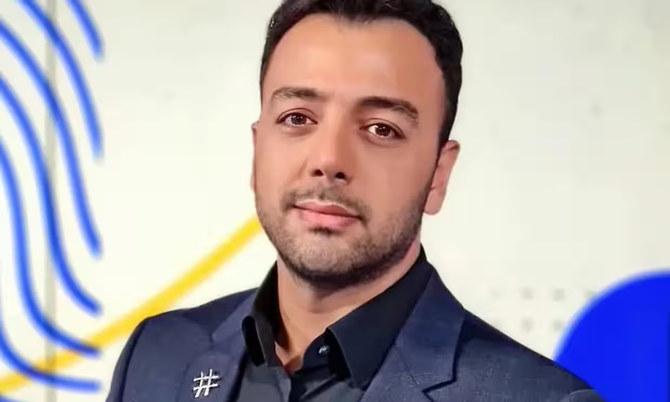
- UK security services believe criminal proxies with links to Tehran carried out London knife attack
LONDON: Police said on Friday that a group of Eastern European mercenaries is suspected to have carried out the knife attack on Iranian journalist Pouria Zeraati in late March.
Zeraati was stabbed repeatedly by three men in an attack outside his south London home.
The Iran International presenter lost a significant amount of blood and was hospitalized for several days. He has since returned to work, but is now living in a secure location.
Iran International and its staff have faced repeated threats, believed to be linked to the Iranian regime, which designated the broadcaster as a terrorist organization for its coverage of the 2022 protests.
Iran’s charge d’affaires, Seyed Mehdi Hosseini Matin, denied any government involvement in the attack on Zeraati.
Investigators revealed that the suspects fled the UK immediately after the incident, with reports suggesting they traveled to Heathrow Airport before boarding commercial flights to different destinations.
Police are pursuing leads in Albania as part of their investigation.
Counterterrorism units and Britain’s security services leading the inquiry believe that the attack is another instance of the Iranian regime employing criminal proxies to target its critics on foreign soil.
This method allows Tehran to maintain plausible deniability and avoids raising suspicions when suspects enter the country.
Zeraati was attacked on March 29 as he left his home home to travel to work. His weekly show serves as a source of impartial and uncensored news for many Iranians at home and abroad.
In an interview with BBC Radio 4’s “Today” program this week, Zeraati said that while he is physically “much better,” mental recovery from the assault “will take time.”
Court orders release of prominent Palestinian professor suspected of incitement

- Nadera Shalhoub-Kevorkian was under investigation after questioning Hamas atrocities, criticizing Israel
- Insufficient justification for arrest, says court
- Detention part of a broader campaign, says lawyer
LONDON: The prominent Hebrew University of Jerusalem professor, Nadera Shalhoub-Kevorkian, was released on Friday after a court order rejected police findings.
The criminologist and law professor was arrested the previous day on suspicion of incitement. She had been under investigation for remarks regarding the Oct. 7 attacks by Hamas and for saying Israelis were committing “genocidal crimes” in the Gaza Strip and should fear the consequences.
On Friday, the court dismissed a police request to extend her remand, citing insufficient justification for the arrest, according to Hebrew media reports.
Protesters gathered outside the courthouse to demonstrate against Shalhoub-Kevorkian’s arrest.
Israeli Channel 12, which first reported the news, did not specify where Shalhoub was arrested but her lawyer later confirmed she was apprehended at her home in the Armenian Quarter of Jerusalem.
“She’s not been in good health recently and was arrested in her home,” Alaa Mahajna said. “Police searched the house and seized her computer and cellphone, [Palestinian] poetry books and work-related papers.”
Mahajna described Shalhoub-Kevorkian’s arrest as part of a broader campaign against her, which has included numerous threats to her life and of violence.
The professor was suspended by her university last month after calling for the abolition of Zionism and suggesting that accounts of sexual assault during the Hamas-led attacks on Israel were fabricated.
The suspension was initially criticized by the university community as a blow to academic freedom in Israel. However, the decision was later reversed following an apology from Shalhoub-Kevorkian and an admission that sexual assaults took place.
Since hostilities began last year, numerous dissenting voices in Israel have faced arrest for expressing solidarity with victims of the bombardment in Gaza.
In October, well-known ultra-Orthodox Israeli journalist Israel Frey was forced into hiding following a violent attack on his home.
Bayan Khateeb, a student at the Technion-Israel Institute of Technology, was arrested last year for incitement after posting an Instagram story showing the preparation of a popular spicy egg dish with the caption: “We will soon be eating the victory shakshuka.”



